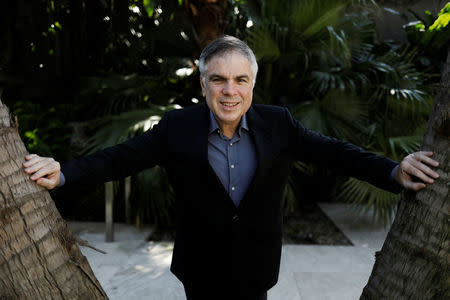Brazil retail magnate Rocha defies left in presidential race
By Anthony Boadle
BRASILIA (Reuters) - Angry leftist protests outside his businesses will not deter billionaire Flavio Rocha from running in Brazil's presidential election this year, advocating a crackdown on crime, a much smaller state and conservative family values.
"A majority of Brazilians are demanding law and order, and the recovery of social values," said Rocha in an interview.
He is stepping away from the helm of clothing maker Guararapes Confecções SA and fashion retail unit Lojas Riachuelo, which are controlled by his family, to join the presidential race with the backing of an established party and powerful evangelical church.
Rocha bolsters a crop of conservative presidential candidates in the 2018 race calling for privatizations and government austerity in what would be a hard right turn for Brazilian politics after leftist presidents won four straight elections.
"Brazilian voters are no longer waiting for handouts from the state. They want a more efficient state that hands out less privileges," said the 60-year-old businessman turned politician.
His message is not welcome in all corners. In the latest sign of blowback, demonstrators protested on Tuesday outside Riachuelo's call center in the northeastern city of Natal.
Rocha said they were angered by his support for a bill proposing the criminalization of the MST landless peasants movement, which farmers hold responsible for invading land and destroying crop dusters and other agricultural equipment.
Two weeks earlier, 800 MST members blocked the entrance to the Riachuelo factory near Natal where 8,000 seamstresses work.
The protests are the latest example of increasingly confrontational politics in Brazil, where the jailing of former leftist president Luiz Inacio Lula da Silva on Saturday for a bribery conviction has tempers running high.
FIGHTING POLITICAL CORRECTNESS
More than 13 years of leftist government under Lula's Workers Party ended in 2016 with the impeachment of his chosen successor and a wave of corruption scandals. Brazilian voters appear fed up with traditional politicians and ready to give right-of-center candidates a new hearing.
Rocha is one of the new voices pulling the political conversation to the right and promising to end what he calls "the dictatorship of political correctness" that he says has allowed crime and corruption to flourish in Brazil with impunity.
His presidential bid was first trumpeted by the Free Brazil Movement (MBL), a libertarian group behind street protests that helped impeach Lula's successor Dilma Rousseff two years ago.
With Lula out of the race, the current front-runner for the Oct. 7 election is far-right Congressman Jair Bolsonaro, a former army captain who took an early lead with his tough law-and-order rhetoric.
Unlike Rocha, Bolsonaro has little experience with economics and has traditionally favored a strong role for the state in Latin America's largest economy. He has also affiliated himself with a small party offering few campaign resources.
By contrast, Rocha recently joined the Brazilian Republican Party (PRB), which has nearly three times as many seats in Congress, orthodox economic proposals and long-standing support from the influential Universal Church of the Kingdom of God.
A change in election rules in 2015 dried up campaign funding from corporations, favoring wealthy candidates like Rocha who can finance themselves.
Rocha's prospects are hard to gauge because he has not been included in recent polls, but political analyst Leonardo Barreto said the time may be ripe for his message.
"Rocha combines the two main issues of this election: a liberal economic agenda and conservative values," said Barreto, who runs the political risk consultancy Factual in Brasilia.
It helps that the family behind the Universal Church also runs TV Record, one of Brazil's biggest networks, Barreto added.
"That could help him take off," he said.
(Reporting by Anthony Boadle; Editing by Brad Haynes and Phil Berlowitz)



